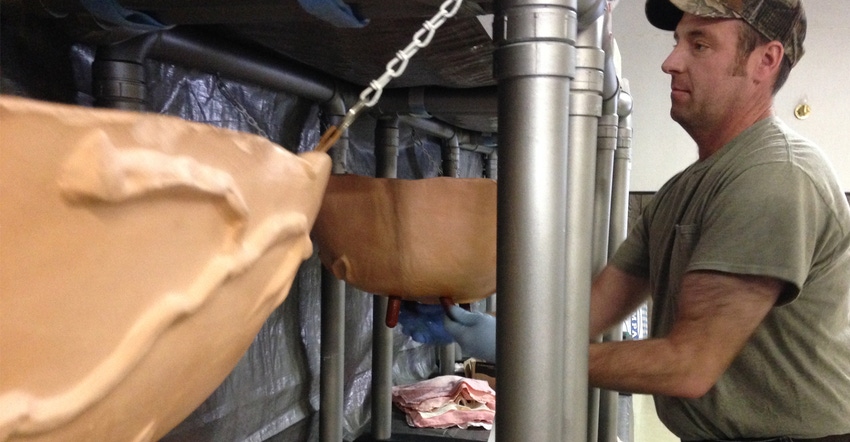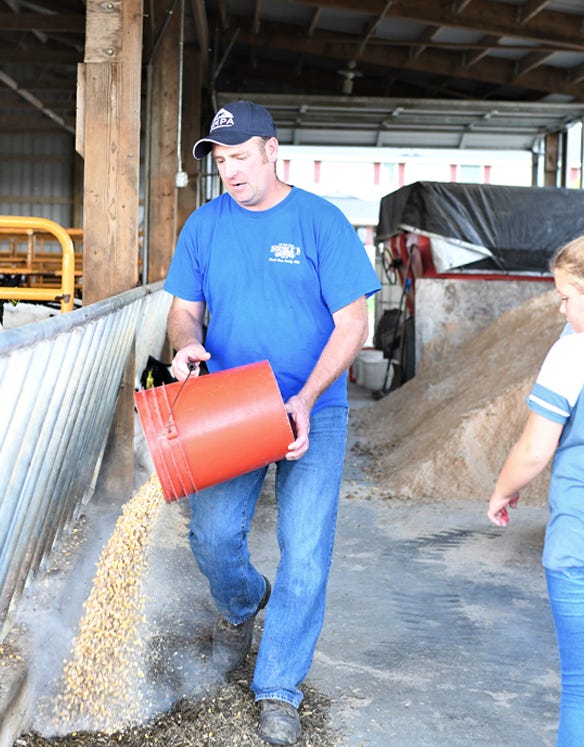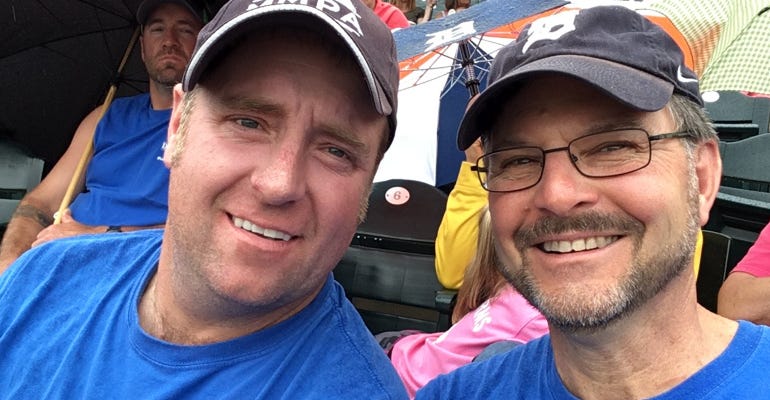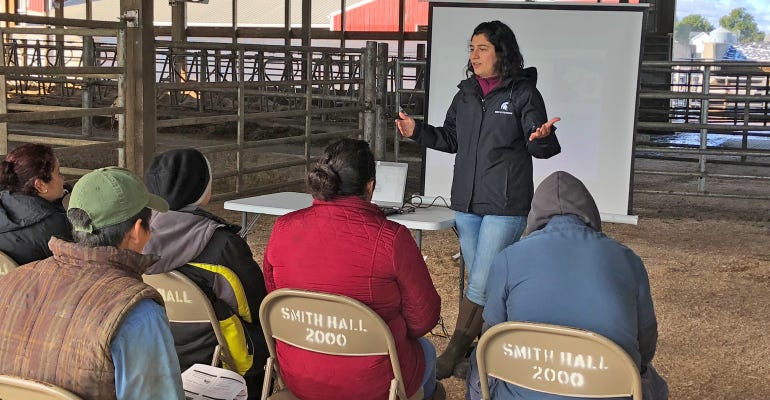June 24, 2020

Jeremy Beebe is facing his toughest challenge in 20 years as a dairy farmer. The novel coronavirus has sent dairy markets on a roller coaster of uncertainty. Without government assistance, he says he could not have paid his eight employees during the crisis at Double B Dairy in Whittemore, Mich.
“We were fortunate enough to receive money through the [Payroll Protection Program], so that’s been nice that we can take care of our employees,” says Beebe, whose farm includes 230 cows and is a five-time winner of the National Milk Quality Awards.
His decadeslong relationship with Michigan State University has helped ease some of the hardships he faces. MSU Extension educators such as Phil Durst have provided comfort and advice.
Related: Complete coronavirus coverage
“Through the 25 years Phil has been at MSU, he and I have become very good friends,” says Beebe, who graduated from MSU’s Institute of Agricultural Technology. “Phil is a terrifically well-rounded individual, and if he doesn’t know something, he knows where to go to find it. He covers so much ground across the state, and he still somehow makes himself available.”
 COVID-19 presents a variety of issues to an already challenged industry. Barry Bradford (left), MSU C.E. Meadows endowed chair in dairy management and nutrition, said the largest hits in May were likely from the lack of food service demand, especially with the closing of schools and universities, and a decline in exports.
COVID-19 presents a variety of issues to an already challenged industry. Barry Bradford (left), MSU C.E. Meadows endowed chair in dairy management and nutrition, said the largest hits in May were likely from the lack of food service demand, especially with the closing of schools and universities, and a decline in exports.
“Food service for cheese and other dairy products generally account for half of domestic production, and plants that were producing for a food-service scale had to find ways to start making products for single-family purchase. That’s been a big headache,” says Bradford, who came to MSU from Kansas State University in January. “We don’t know for sure to what extent exports have dropped, but there has been a big drop, which accounts for about 15% of production in the U.S.”
“All in all, total demand had dropped at least 20% by mid-May,” he adds.
Most of the milk Beebe produces goes into making mozzarella cheese. Prices in June are now reaching highs not seen in years.
“At this point, cheddar cheese prices are approaching a historic high, largely due to a huge purchase by the federal government,” Bradford says. “For various reasons [including responses by producers and summer heat stress], almost all milk dumping that was occurring a month ago is now done. Prices, at least for June, are reasonable again.”
Reaching out
In addition to handling the constantly changing, tangible impacts of COVID-19, MSU Extension educators also are focused on assisting farmers on a personal level. Durst has reached out to more than 70 dairy farmers from some operations that have been around for as long as 100 years.
“People are afraid of what the future holds,” he says. “It's been hard because we all want to go and speak face to face with people, and to be able to further assess how they're doing. Mental health is a big issue. It's important to be able to have the science to share, but maybe the most important thing right now is just talking about how farmers are handling all this stress. I think it's important that we balance providing the resources and also connect people to people, and try to empathize with them, to listen to them, and to challenge them.”
Bradford says his main goal during the crisis is opening as many lines of communication as possible. He created a webinar series titled “Sharpen Your Dairy Skills while We Flatten the Curve,” in which a variety of experts present information on specific dairy topics, while also providing an outlet for producers to reach out with questions and concerns. Topics have included dealing with the Payroll Protection Program and dairy revenue protection strategies.
“We just wanted to let them know we are available, and we are trying to anticipate the sort of unprecedented questions they are dealing with,” Bradford says.
Important partnerships
MSU has been partnering with the Michigan Milk Producers Association since the commodity organization was formed in 1916 on the grounds of what was then Michigan Agricultural College. Sheila Burkhardt, MMPA senior director of member and government relations, says her organization is sharing more MSU resources than it ever has since the COVID-19 outbreak.
“MSU’s transition to virtual training and programming has enabled producers to readily connect to information that they have relied on from MSU,” she says. “We have shared with members the opportunity to connect with the MSU dairy team members in their virtual Dairy Team Coffee Breaks held on a regular basis.”
Paola Bacigalupo-Sanguesa, who was born and raised in Chile, is as an MSU Extension dairy educator for southern Michigan. Specializing in dairy animal health and employee education, she has developed a series of COVID-19 videos in Spanish that dairy producers and managers can share with their employees, many of whom speak Spanish as their first language. These videos are available on the MSU Extension dairy team YouTube channel.
“As English speakers, we are bombarded with information about what COVID-19 is and what we can do to prevent it,” Bacigalupo-Sanguesa says. “But for Spanish-speaking employees, we can’t assume they're getting that information. My last day on a farm, I had one man come up to me and ask, ‘I have this and this symptom, do you think I have it?’ Some of them are worried if they get sick and miss work they might lose their jobs.”

MSU PARTNERSHIP: Jeremy Beebe, who farms in Whittemore, Mich., has partnered with MSU Extension on a corn research plot at his farm.

Durst and Bacigalupo-Sanguesa both say they empathize with the farmers whom they have not been able to work with face to face because of the pandemic.
“I struggle seeing farmers struggle, because they're my friends,” Durst says. “When they hurt, I hurt. The thing I'm concerned about the most with this pandemic is the loss of community. But maybe what it does is actually brings us together.”
Fortunately, financial assistance is on its way. According to the Coronavirus Food Assistance Program, small- to medium-sized dairy farms will receive $6.20 per 100 pounds of milk produced in the first quarter of 2020. Bradford says that should be enough to backfill lost revenue from low prices in the midst of the pandemic. He added the industry must remain focused on the future and attempt to anticipate issues Michigan milk producers will face once aid ends.
“We are examining how we can continue to help dairy farms after the CARES Act and government assistance is gone,” Bradford says. “I think those assistance programs will keep some dairy businesses afloat in the short term, but what gets scary is in six months, things are going to get pretty ugly pretty fast. As a society, we need to think through what we can we do to try to scale up exports or retool our food distribution channels as fast as possible. It's a big, complex system we need to try to get a handle on it.”
History of helping
MSU has supported the state’s dairy industry for more than 100 years, providing research, outreach and teaching. Bradford says he plans to unite all of the university’s resources in one central repository to help advance the industry in both good and bad times.
“Our primary mission is to help support the dairy industry to be sustainable,” Bradford says. “For that to happen, we have to provide the tools to help people make it through these tough situations and come out the other end, and continue producing a valuable product for society. That doesn't mean that within our small dairy team we have all those resources. But we should work with this huge network within the university and collaborators across the state, where we have really broad expertise, and we should really be bringing all those tools to bear.”
MSU Extension provides dairy producers with a number of resources, including market research, marketing plans, labor management, animal care and efficiency with employees and resources. Some farmers, such as Beebe, also host MSU research plots on their farms.

FRIENDSHIP: Jeremy Beebe, owner of Double B Dairy in Whittemore, Mich., has built a lasting relationship with MSU Extension dairy educator Phil Durst (right), as the two have worked together to grow Beebe's dairy farm over the past two decades.

“They will always give you an unbiased opinion," Beebe says "They are going to tell you what's best because they think it's the best, not because of what brand it is. I don't think enough people use Extension services. I mean, it's there to use, and it's paid for by your tax dollars. It's there for free, and they're smart people.”
Bacigalupo-Sanguesa says MSU’s versatility and flexibility makes it easier for her to respond to farmer needs.
“We get that we cannot support [farmers] in every way, but our strength is we have so many people with so many different skills we can bring a multilevel approach to problems,” she says. “I enjoy when I can see change on a farm with employee education or production numbers. To believe I had something to do with helping make progress on a farm, that is the fulfillment I get from this job.”
Mental health
Durst credits MSU AgBioResearch and the College of Agriculture and Natural Resources for providing educators with the research and information to help farmers, including more programming on mental health.
“Our objective is improving the business or improving how farmers care for the environment, or how they care for animals or how they care for people, based on integrated resources, because we're not just looking at one aspect of dairy farming,” he says. “We really have tried to make the issue of mental health something farmers are willing to talk about and not shy away from just because it's not comfortable.”
Also, Bradford says he will encourage dialogue and debate about contentious issues.
“In Extension, we want to help connect people that maybe don't have a dairy or agriculture background to the opportunities in the industry,” he says. “On the academic side, we should be finding the time to engage with big picture, long-term forecasts, like the global demand for dairy and the how the planet can actually sustain the demand.”
Since starting at his position in January, Bradford has worked to meet as many people involved with the dairy community as possible and let them know MSU is committed to supporting the industry.
“I would like producers in this state to know where they can turn when they run into a challenging problem,” he said. “We want to play a role in developing more strategic planning. I think anything in agriculture, and especially dairy, where you've got so many daily tasks to take care of, can become all-consuming and you never have time to stop and think about where this business is going in 10 or 20 years. Trying to get producers access to the people they need to enable that strategic planning, and to flat out encourage people to think in that way, I think would be one of my big goals.”

EDUCATIONAL OUTINGS: Paola Bacigalupo-Sanguesa speaks to dairy farmers in Westphalia, Mich., about cow care.

Bradford also is focused on recruiting undergraduate students to become more involved with the dairy industry, which is experiencing a lack of labor. The MSU Dairy Teaching and Research Center is instrumental in helping in this regard.
“For a lot of a lot of students, [DTRC] is their first opportunity to be on a dairy [farm] and to touch a cow,” says Faith Cullens, who served as interim manager of DTRC before recently being named the director of the South Campus Animal Farms.
“We train a lot of veterinarians that have zero dairy experience. Just getting them comfortable being around the animals is huge,” she adds. “A lot of our students want to be veterinarians or work in the dairy industry. I'm an example. I had never been on a dairy farm until I was here as a student.”
DTRC research was forced to temporarily shut down in response to COVID-19. The farm serves as a teaching, research and outreach tool to support the state’s dairy industry. Cullens says there are usually two or three research projects going on at the farm at any given time, and those projects should ramp back up as soon as restrictions lift. The farm also hosts tours to see an operating dairy farm and hosts producers who might have specific questions related to their farms.
“The way we fit in to the state’s dairy community is by doing the independent research that can’t be done on commercial farms,” Cullens says. “We have the facilities and the expertise to do that work.”
Michigan’s stay-at home order required Cullens to limit public and employee access to the farm, but the animals were cared for by essential employees.
Through shutdowns and crises, Burkhardt says MSU remains engaged with its partners.
Whitmore is a communications manager with MSU ANR Communications and Marketing. Reach him at [email protected].
Source: MSU, which is solely responsible for the information provided and is wholly owned by the source. Informa Business Media and all its subsidiaries are not responsible for any of the content contained in this information asset.
Read more about:
Covid 19You May Also Like




